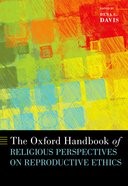 The Oxford Handbook of Religious Perspectives on Reproductive Ethics
The Oxford Handbook of Religious Perspectives on Reproductive Ethics
Contents
-
-
-
-
-
-
-
-
-
-
-
-
-
-
The Divine Image: Biblical and Rabbinic Foundations of Religious Humanism The Divine Image: Biblical and Rabbinic Foundations of Religious Humanism
-
Abortion and the Status of the Embryo: From aggadah to halakhah Abortion and the Status of the Embryo: From aggadah to halakhah
-
Interpreting Biblical Law: Rabbinic vs. Hellenistic Judaism Interpreting Biblical Law: Rabbinic vs. Hellenistic Judaism
-
Medieval Teachings: Valuing the Full-Term Embryo Medieval Teachings: Valuing the Full-Term Embryo
-
Modern Jewish Debates: Halakhah, Ethics, and Gender Modern Jewish Debates: Halakhah, Ethics, and Gender
-
Abbreviations Abbreviations
-
Notes Notes
-
Bibliography Bibliography
-
-
-
-
-
-
-
-
-
-
21 Abortion in the Jewish Tradition of Religious Humanism
Get accessNoam Zohar is professor of philosophy in Bar Ilan University, and director of its graduate program in bioethics. He has received visiting fellowships at Harvard University and at the Institute for Advanced Study in Princeton. His research and teaching are in the fields of moral and political philosophy, with an emphasis on applied ethics—particularly bioethics and the ethics of warfare; as well as the fields of rabbinics and philosophy of Halakhah. His publications include essays and books in those fields, including Alternatives in Jewish Bioethics (SUNY Press, 1997); Quality of Life in Jewish Bioethics (ed., Lexington Books, 2006). With Michael Walzer and Menachem Lorberbaum he is editor of the series The Jewish Political Tradition (Yale University Press: Volume 1: Authority [2000]; Volume 2: Membership [2003]; Volume 3: Community [2018]; and Volume 4: Politics in History [forthcoming]). He has served in various bioethics commissions and advisory boards, including Israel’s national bioethics council.
-
Published:19 September 2024
Cite
Abstract
This chapter seeks to examine and integrate the diverse positions on abortion in the Jewish tradition by focusing on its underlying value perspective of religious humanism: human beings are created in the Divine Image. Arguing that literary and homiletic materials of aggadah are too ambiguous for normative guidance, the discussion here focuses on halakhah—the Jewish tradition of normative discourse. The fundamental Biblical passage is the law in Exodus regarding the causing of miscarriage, which clearly does not regard feticide as murder. Departing from the text’s plain meaning, Hellenistic and some other Jews regarded a fully formed fetus as embodying the Divine Image. The rabbis of the Mishnah and Talmud, however, held that although there is a religious duty to promote the Divine Image through procreation, only a born infant is a person (nefesh) commanding full respect for its life. This has left room for disparate medieval and contemporary positions regarding the permissibility of abortion.
Sign in
Personal account
- Sign in with email/username & password
- Get email alerts
- Save searches
- Purchase content
- Activate your purchase/trial code
- Add your ORCID iD
Purchase
Our books are available by subscription or purchase to libraries and institutions.
Purchasing information| Month: | Total Views: |
|---|---|
| September 2024 | 2 |
| November 2024 | 5 |
| January 2025 | 4 |
| February 2025 | 4 |
| March 2025 | 1 |
| April 2025 | 3 |
Get help with access
Institutional access
Access to content on Oxford Academic is often provided through institutional subscriptions and purchases. If you are a member of an institution with an active account, you may be able to access content in one of the following ways:
IP based access
Typically, access is provided across an institutional network to a range of IP addresses. This authentication occurs automatically, and it is not possible to sign out of an IP authenticated account.
Sign in through your institution
Choose this option to get remote access when outside your institution. Shibboleth/Open Athens technology is used to provide single sign-on between your institution’s website and Oxford Academic.
If your institution is not listed or you cannot sign in to your institution’s website, please contact your librarian or administrator.
Sign in with a library card
Enter your library card number to sign in. If you cannot sign in, please contact your librarian.
Society Members
Society member access to a journal is achieved in one of the following ways:
Sign in through society site
Many societies offer single sign-on between the society website and Oxford Academic. If you see ‘Sign in through society site’ in the sign in pane within a journal:
If you do not have a society account or have forgotten your username or password, please contact your society.
Sign in using a personal account
Some societies use Oxford Academic personal accounts to provide access to their members. See below.
Personal account
A personal account can be used to get email alerts, save searches, purchase content, and activate subscriptions.
Some societies use Oxford Academic personal accounts to provide access to their members.
Viewing your signed in accounts
Click the account icon in the top right to:
Signed in but can't access content
Oxford Academic is home to a wide variety of products. The institutional subscription may not cover the content that you are trying to access. If you believe you should have access to that content, please contact your librarian.
Institutional account management
For librarians and administrators, your personal account also provides access to institutional account management. Here you will find options to view and activate subscriptions, manage institutional settings and access options, access usage statistics, and more.